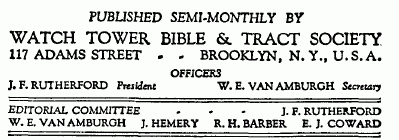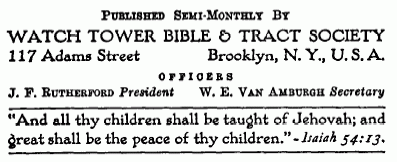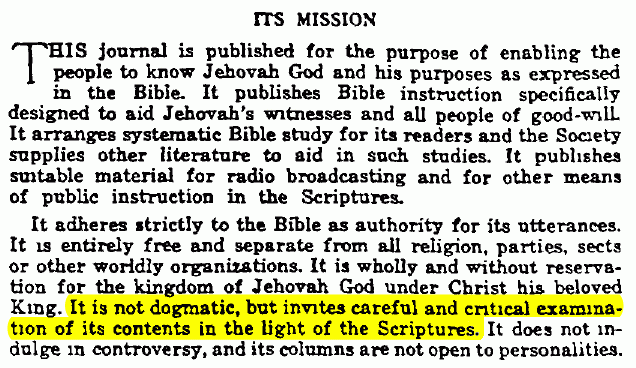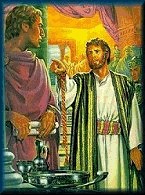|
Does official court testimony claim that The Watchtower is
God's Word?
In a word, NO. The way critics frame the testimony though shows that this
what they want you to think. (Compare Psalms 94:20-21.)
The court transcript quotations used most often are shown below, including replies from members of the Governing
Body of Jehovah's Witnesses. However, these "infamous" quotations conveniently leave out the context
since this is what contradicts the very points the critics are trying to make:
Cross-examination of Frederick W. Franz in the case of Olin Moyle v. WTB&TS, 1943, Sections #2596-2597,
p. 866.
Q. At any rate, Jehovah God is now the editor of the paper, is that right?
A. He is today the editor of the paper.
Q. How long has He been editor of the paper?
A. Since its inception he has been guiding it.
Cross-examination of Nathan Homer Knorr in the case of Olin Moyle v. WTB&TS, 1943, Section #4421, p. 1474.
Q. In fact, it is set forth directly as God's Word, isn't it?
A. Yes, as His word.
Q. Without any qualification whatsoever?
A. That is right.
Presented below is the removed context. The portions that match the above quotations are underlined.
The portions of the context that contradict the above quotations (when taken out of context) are in bold:
Court Transcripts: Olin Moyle vs. The Watch Tower Society
1943.0000 OM,794-796 Fred Franz, for the defense, under direct examination:
Q. Is the "Watch Tower" magazine a one man magazine?
A. It is not.
Q. Who was the editor of the magazine in the days from 1900 to 1916?
A. Pastor Russell was the Editor, the sole Editor of the "Watch Tower" down to his death in 1916.
Q. Who became the editor of the magazine upon the death of Pastor Russell?
A. Pastor Russell left a will designating five gentlemen to serve on an editorial committee, three of which must
agree as to an article.
The Court: He asked you who they were.
Q. Do you remember who they were?
The Court: Do you? If you don't remember, tell us.
Q. The names, and if you don't remember the names -- You say there were five?
A. Judge Rutherford was one of them. Mr. Van Amburgh was another and Fred Robison was another.
Q. Was there any provision in the Charter of the Watch Tower Bible and Tract Society for such an editorial committee?
A. No, that was the Will of Pastor Russell.
Q. Who subsequently became the Editor of the magazine, the main editor of the "Watch Tower" magazine?
A. In 1931, October 15th, as I recall, the "Watch Tower" discontinued publishing the names of any editorial
committee on the second page.
The Court: He asked you who became the editor.
The Witness: And it said --
The Court: Who became the editor?
Q. Who became the editor when this was discontinued?
A. Jehovah God.
Q. And who wrote the magazine under the direction of Almighty God?
A. Various individuals contributed to the magazine, Judge Rutherford, and others.
Q. Who passed on what went into it?
A. Judge Rutherford, primarily, and he also called in associates --
The Court: Who had the final say?
The Witness: Judge Rutherford supervised everything that went into the magazine, sir.
Q. Is the "Watch Tower" magazine dogmatic?
Mr. Bruchhausen: I object to that.
The Court: Objection sustained.
Mr. Covington: That is a statement that has been read to the jury from the magazine and I want to explain that.
Mr. Bruchhausen: Unless it is in the magazine.
Mr. Covington: It says it is not dogmatic and I want to have him explain.
The Court: It doesn't say that?
Mr. Covington: Yes.
Mr. Bruchhausen: Then I will withdraw the objection.
The Court: And I will permit the answer.
A. The magazine is not dogmatic. Dogma literally means opinion and the "Watch Tower" does not set for
the opinion of man. The "Watch Tower" instead of being dogmatic is confident because it bases its
conclusions upon the word of God and therefore it is sure of the ground upon which it is walking. It does not arrogantly
assert any opinion with unwarranted positiveness.
1943.0000 OM,865-866 Fred Franz, for the defense, under cross-examination:
Q. I understand that you say that in 1931, the Watch Tower discontinued naming the editorial committee, and
then Jehovah God became the editor, is that correct?
A. Jehovah's editorship was indicated thereby citing Isaiah 54:13.
|
1931 October 1st Watchtower, p. 2
|
|
1931 October 15th Watchtower, p. 2
|
 |
|
 |
The Court: He asked you if in 1931 Jehovah God became editor, according to your theory.
The Witness: No, I wouldn't say so.
Q. Didn't you say the Jehovah God became the editor of this paper at some time.
A. He was always the one guiding the course of the paper.
Q. Didn't you state that on October 15, 1931, the Watch Tower discontinued the naming of an editorial committee
and then Jehovah God became the editor?
A. I didn't say Jehovah God became the editor. It was appreciated that Jehovah God really is the One who is editing
the paper, and therefore the naming of an editorial committee was out of place.
Q. At any rate, Jehovah God is now the editor of the paper, is that right?
A. He is today the editor of the paper.
Q. How long has He been editor of the paper?
A. Since its inception He has been guiding it.
Q. Even before 1931?
A. Yes, sir.
Thus, far from claiming divine inspiration, the claim was made that Jehovah is merely "guiding the course,"
in agreement with Isaiah 54:13, "all thy children shall be taught of Jehovah." (American Standard
Version. For the record, 1931 predated the New World Translation.)
What follows is the removed context of the testimony of Nathan H. Knorr. That his testimony has been abused
like Frederick Franz's will be apparent:
1943.0000 OM,1472-1474 Nathan Homer Knorr for the defense, under cross-examination:
Q. There have been many changes of doctrine in this organization while you have been there, haven't there?
A. Some changes.
Q. Do you subscribe to what Mr. Franz said, that God erected the Watch Tower in 1918?
A. Will you repeat that?
The Court: Read the question.
(The stenographer read the question as follows: "Q. Do you subscribe to what Mr. Franz said, that God had
erected the Watch Tower in 1918?")
A. Yes, He has.
Q. Do you recall this writing, "Finished Mystery" which was published in 1917?
A. I recall the publication, yes.
Q. You recall that was an exposition of Revelation and Ezekiel and was circulated to the amount of millions of
copies to 1930 by the Watch Tower?
A. That is right.
Q. It was written by Messrs. Woodworth and Fisher?
A. That is right.
Q. And the Watch Tower has accepted that as a truth, hasn't it?
A. Generally, yes.
Q. Then do you recall that in 1930 Mr. Rutherford wrote this book "Light" which came out in two volumes?
A. Yes.
Q. And in that don't you recall that he made an exposition of Revelation which was different than set forth in
the "Finnish Mystery" [sic: "Finished Mystery"]?
A. Yes, sir.
Q. And after that time this doctrine announced in "Light" took the place of the doctrine announced in
"Finished Mystery"?
A. Yes.
Q. So that the doctrine set forth in the earlier work was erroneous?
A. Yes. I might say, if I can express further --
Q. Well, it was erroneous, was it not?
A. Well, not all of it was erroneous. The Light shines more and more under the perfect day, and as things become
clearer it is much easier to understand the Scriptures. It is difficult to understand Scripture until things have
transpired to fulfill those Scriptures.
Q. God was writing these books ever since 1918, wasn't he?
A. I wouldn't say God was writing them.
Q. They were written under the influence of God, weren't they?
A. They were written by men in the service of God's Organization, to bring to the attention of the People the truths
as expressed in the Bible.
Q. Would you say that God's views have changed between 1918 and 1930?
A. God's views never changed, and their only expression is in the Bible, which is God's word. Man can make a mistake
in the interpretation thereof.
Q. So that these leaders of agents of God are not infallible, are they?
A. That is right.
Q. But when you put out these writings in the Watch Tower, you don't make any mention, to those who get the papers,
that "We, speaking for God, may make a mistake," do you?
A. When we present the publications of the Society, we present it with the Scriptures, the Scriptures set forth
in the Bible. The citations are given in the writing; and our advice to the People is to look up these Scriptures
and study them in their own Bibles in their own homes.
Q. But you don't make any mention in the fore part of your Watch Tower that "We are not infallible and subject
to correction and may make mistakes"?
A. We have never claimed infallibility.
Q. But you don't make any such statement, that you are subject to correction, in your Watch Tower papers, do you?
A. Not that I recall.
Q. In fact, it is set forth as God's Word, isn't it?
A. Yes, as His word.
Q. Without any qualification whatsoever?
A. That is right.
Q. Do you subscribe to this statement that has been made in court, that Christ suffered for the obedient ones?
A. Yes I do.
Q. Do you recall this part of the Scriptures in Romans, 5, 6, [sic: Romans 5:6] that "* * * in due
time Christ died for the ungodly"?
A. Yes.
While The Watchtower magazine in its fore part, page 2, did not have a specific statement of being "subject
to correction," it did not need to as it did have a disclaimer to being fallible in its fore part! Entitled
"Its Mission," it said of The Watchtower magazine: "It is not dogmatic, but invites careful
and critical examination of its contents in the light of the Scriptures." (See image below, copied
from a 1943 Watchtower—highlight added.) This disclaimer read this way throughout the 1940's.

So what about the underlined portion in the court transcript above? Mr. Knorr may have thought the lawyer's
"it" was the Bible, as only the Bible is set forth as God's Word without qualification, especially if
the lawyer was holding up or pointing to a Bible when asking the question, which may find support in that just
two questions later he referred to the Bible in Romans 5:6. Or Mr. Knorr may have meant that the scriptures in
the magazine are set forth as God's Word without qualification, as "Its Mission" also declares that "it
adheres strictly to the Bible as authority for its utterances." Either way, both the court testimony and "Its
Mission" testify that the magazine is non-inspired and fallible. Case closed.
In conclusion, aside from ignoring The Watchtower's disclaimer, to take the above underlined portions
away from their qualifying contexts amounts to dishonesty and lack of integrity. In Proverbs 6:17, a false tongue
is one of the seven things that is detestable to God, and other scriptures cast having a tricky tongue in a dishonorable
light. (For instance, see: Psalm 120:2, Micah 6:12, and Zephaniah 3:13.) Yet, to knowingly isolate the underlined
portions is just that: using a false, tricky tongue. If you associate with a group that has used this dishonest,
carefully contrived argument, then it's time to sever all connections with it!
|

